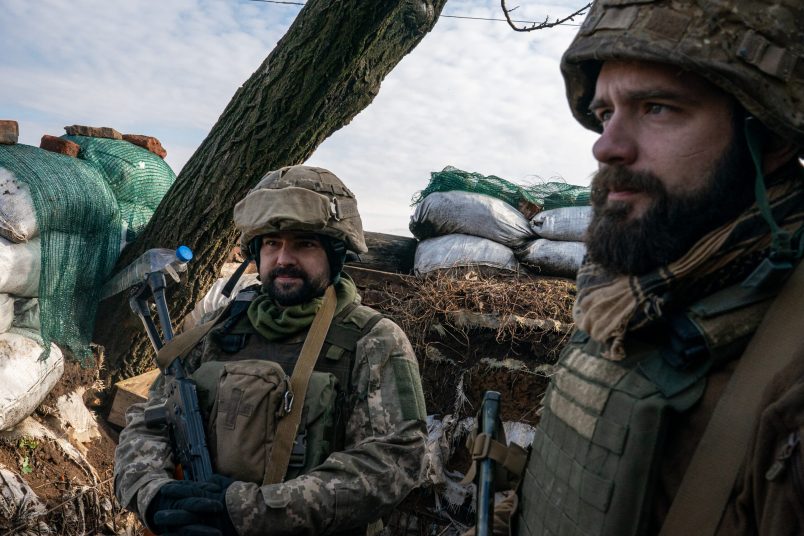As Russian President Vladimir Putin escalated the Ukraine crisis over the past several months, he retained a range of key options.
Recognize the Russia-backed breakaway territories of Donetsk and Luhansk? Conduct a limited offensive in Ukraine’s east? Pound Ukraine with missiles but leave ground troops out of it?
Of these options, he appears to have chosen the most extreme: a full-fledged, multiple-pronged assault on all of Ukraine, bringing the full might of the Russian military to bear on its neighbor while enlisting Belarus as a war ally.
“This is as big as he could go,” Jeffrey Edmonds, a former Russia director at the NSC and senior research scientist at CNA, told TPM. “If he’s going to destroy Ukraine’s military and seize the capitol, this is what he had to do.”
Ukrainian officials have said that they face attacks from multiple axes: an invasion via the south from Crimea, an offensive in the war-torn east along the country’s contact line with Russian proxies, and assaults from the north towards the city of Kharkiv and, separately, from across the Belarusian border, headed towards Kyiv.
Russian forces appeared to make the quickest advance in the south, with video online showing tanks in the Ukrainian city of Kherson.
“Ukraine is under attack from the north, east and south,” Ukrainian President Volodymyr Zelensky said in a statement. A separate statement from his office said that Russian forces had staged an attack in Volyn oblast, a far-western region close to the country’s border with Poland.
Separate reports indicate that Russian paratroops successfully took Antonov Airport, a military airfield on the outskirts of Kyiv.
Putin declared war in an early-morning speech in which he repeated denials of Ukraine’s statehood, and called the country a historical part of Russian territory.
As the speech concluded, and as Putin made a barely veiled threat to NATO should it intervene, missile and artillery strikes began across Ukraine.
Ukraine’s military commanders, the General Staff, said on Thursday that the initial wave of strikes largely focused on military airfields, bases, ammo dumps, and command-and-control centers.
Military analysts had predicted that Russia would start its campaign with what Edmonds described as an “aerospace attack” — strikes aimed at taking out runways, air defenses, and military supply sites that could last for days.
In Ukraine’s case, that phase ended almost immediately.
“I think they’re fairly confident in their ability to push the Ukrainians back,” Edmonds said. “They must be fairly confident about having airspace superiority.”
As of this writing, other reports indicate that Russian forces are nearing the city of Kharkiv, Ukraine’s second-largest. Explosions have also sounded at airfields in country’s far western cities, some of which are located a few hours’ drive from neighboring NATO states.
The thrust of land assaults appear to be directed at the largest concentrations of Ukrainian army units and at political objectives, like Kharkiv and Kyiv.
In his Thursday morning speech, Putin said that the operation would lead to the “demilitarization and denazification of Ukraine.”
It’s a promise that Russia is focused on regime change — a political end, the outcome of which will rely on whether it sticks. Will Ukrainians accept whatever Russia imposes, or revolt?
“If you’re the Russians, you want this in a certain sense to be as painful as possible for the Ukrainian government and military but least for the people themselves,” Edmonds said. “In a certain sense, they want to be seen as the saviors that came in.”
Zelensky said in a statement posted online that the attack was an assault on his control of the government, and on the country’s independence. Reports online appear to show civilian casualties in the cities of Uman and Kharkiv.
“Ukraine is defending itself and will not give up its freedom, no matter what Moscow thinks,” Zelensky said. “For Ukrainians, independence and the right to live on their land according to their will is the highest value.”







Many people are saying TFG had a spontaneous orgasm when he heard about the invasion.
Maybe Putin is admirer of Michael Ledeen, and decided to
" Every ten years or so, the
United StatesRussia needs to pick up some small crappy little country and throw it against the wall, just to show the world we mean business, "Trump and the Republicans need to constantly be labeled as what they are, traitors may be a strong word, but maybe not. Fox News, all of them.
Tucker Carlson has been hospitalized with a terminal case of priapism.
Had to be drug induced. He doesn’t have what it takes. No balls either.